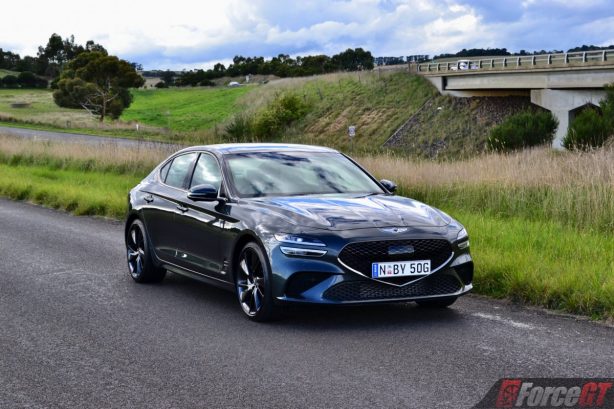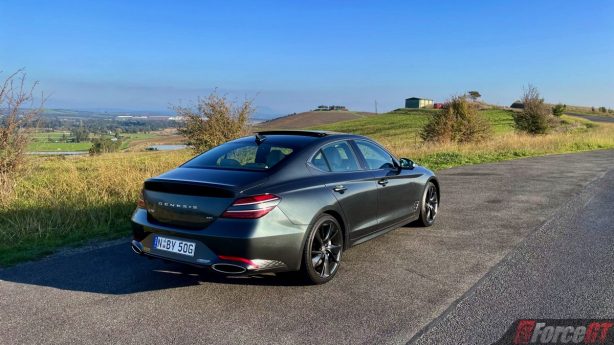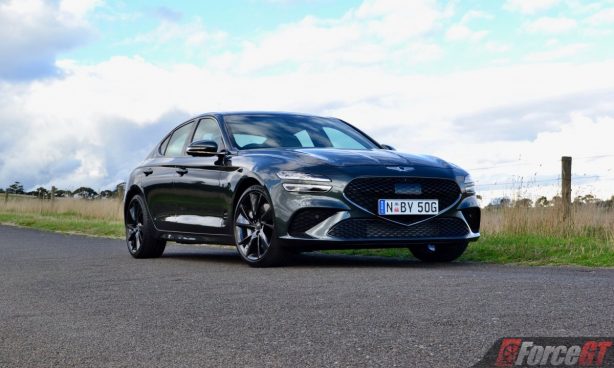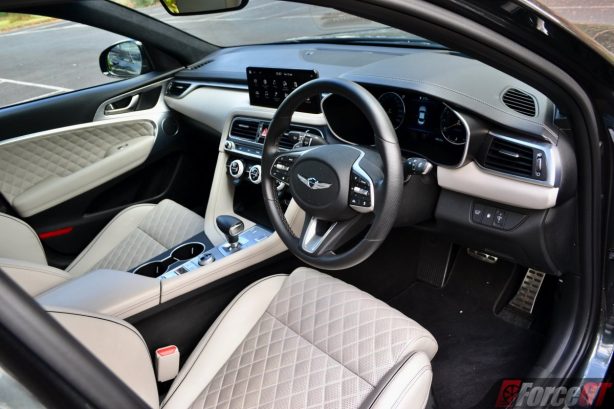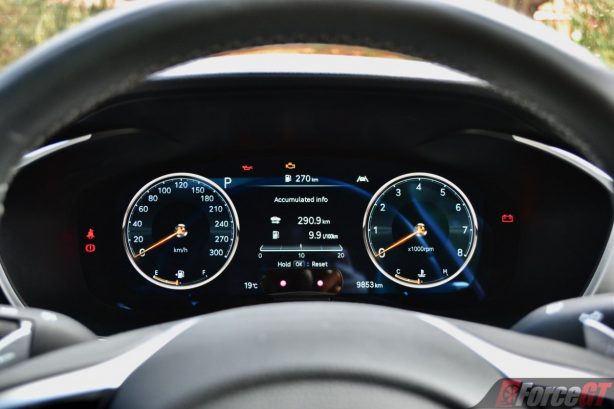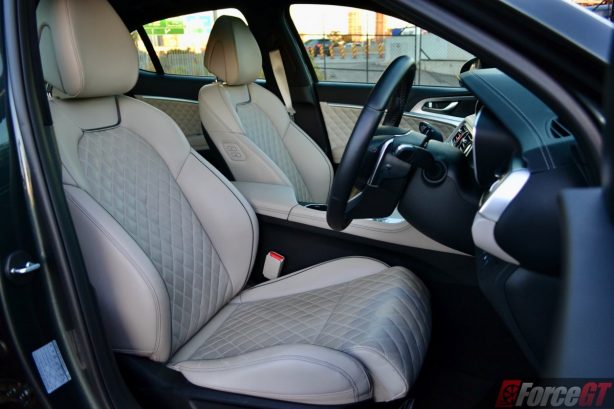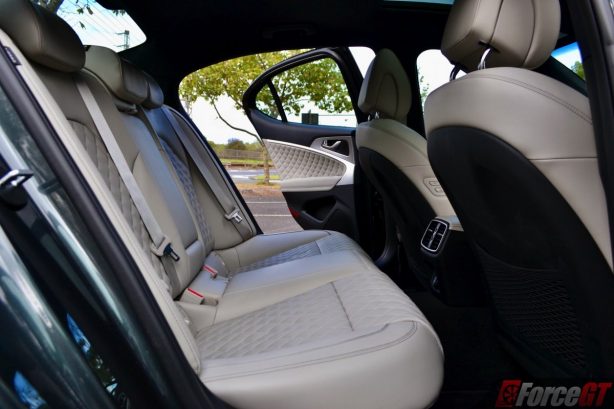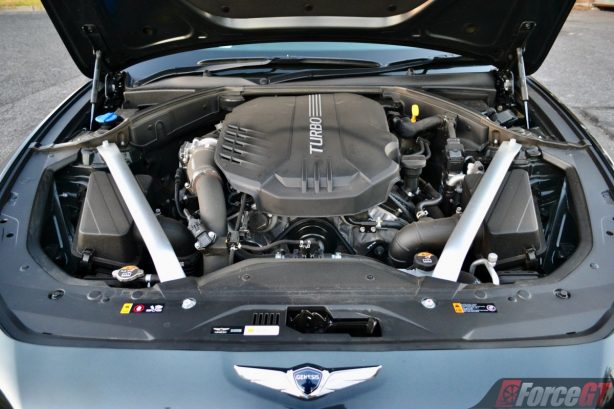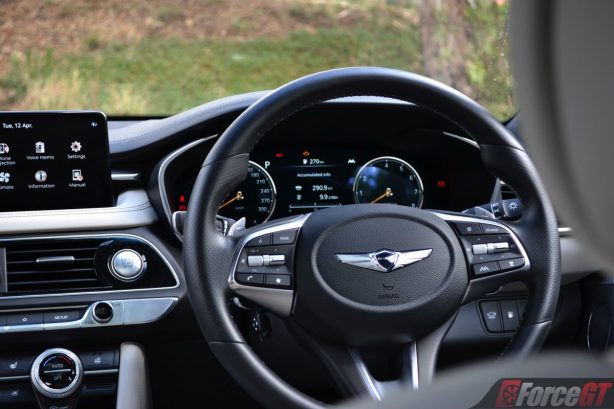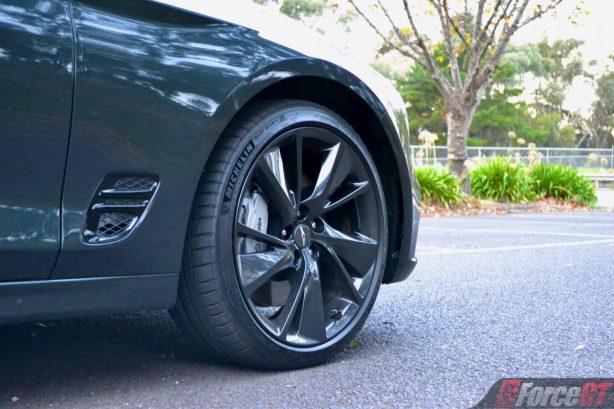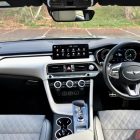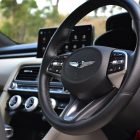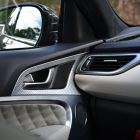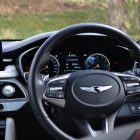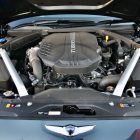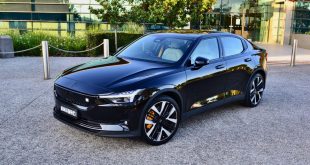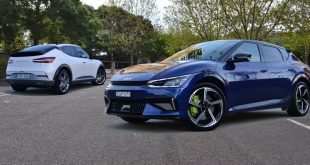For decades, the BMW 3 Series and Mercedes-Benz C-Class have been battling it out in the compact executive segment. So dominant have those models become, that left field options have had little success in shaking up the status quo.
Perfectly good cars like the Audi A4 and Lexus IS have tried to sway buyers for a long time, but they are often written off the list simply because they are not the 3 Series or C-Class.
Just when you thought brands giving up on the segment and leaving it to the mighty German duo, here comes another challenger. Well, it actually arrived back in 2019, but things have gotten a lot more serious with this refresh in 2022.
The challenger is the Genesis G70. For those who are not familiar with the Genesis brand, it’s the luxury arm of Hyundai that started in 2015, and the G70 is – currently – the entry point into the premium brand. If Genesis’ aim was for the brand to be discovered by more people, the G70 is the model tasked with achieving that goal.
2022 Genesis G70 price (excluding on-road costs):
2.0T: $63,000
3.3T: $76,000
Options:
Sport Line Package: $4,000 (standard on 3.3T)
Luxury Package: $10,000
Matte Paint: $2,000
Is there anything interesting about the way it looks?
The 2022 Genesis G70 has been given a major facelift, with the front fascia completely redesigned and the rear sporting new taillights and bumper. Bringing the styling more inline with the Genesis family look, the new G70 now features the company’s signature quad lamps that circumvent all sides of the car, with the indicator light bar neatly integrated within. The ‘Crest Grille’, the brand’s corporate face, sits bold and proud up front, giving it unmistakable road presence.
Being the G70 Sport, our tester boasts a host of sporty touches including dark chrome for the crest grille, black side air vents and those new style 19-inch gloss black wheels.
It’s amazing how a facelift – if done right – could transform the looks of a car. Not that the pre-update G70 was ugly by any means, if fact it’s already a handsome machine with good proportions, but this new model just elevates things up a level. It looks so much more premium and sophisticated. It is genuinely a great looking car.
Does the interior stack up?
Genesis has been churning out some truly exquisite interiors lately, like those seen in the GV70, G80 and GV80. Those new models feature the brand’s ultra posh cabin design which, unfortunately, isn’t seen here in the updated G70.
And there’s a good reason for it. First launched in 2019, the G70’s cabin was penned before Genesis’ slew of new generation cabins were introduced. So, the original G70 interior, which is still nice and premium, has been carried over to this updated model largely unchanged.
That said, Genesis did make the effort to update some essentials, such as the larger 10.25-inch infotainment unit and, if the $10,000 Luxury Package is optioned, a 12.3-inch 3D virtual instrument cluster.
It’s apparent the infotainment unit is straight out of a Hyundai, running the same interface as those used in its more mainstream cousins. While there isn’t much wrong with this interface other than those painfully small icons in map view, it just isn’t very ‘premium’. Genesis does have its own bespoke infotainment but it’s probably not compatible – at least for now – for an older Genesis model like the G70.
Our tester is fitted with the Luxury Pack and it gets the super cool 3D instrument cluster. If you’re wondering, no you don’t need 3D glasses. It works by using stereoscopic cameras under the instrument binnacle to locate the driver’s eyes and augment the fully LCD instrument panel to give a sense of depth to the virtual gauges.
Other luxurious touches for 2022 include richly tactile (if not a little old fashioned) cross stitched quilting and classy geometric patterned trim inserts.
Luxury Package further brings suede headlining and pillar covers, aluminium trim inserts, Nappa leather upholstery and sports pedals.
Also part of the Luxury Package is the 15-speaker Lexicon premium audio system. While it has good sound clarity, more work needs to be done to raise the bass as it’s seriously lacking.
Elsewhere, interior ambient strip lighting, featured in all key rivals and a must have for any luxury car these days, is still missing in the G70.
Every G70 now comes with heated and ventilated front seats and an improved Qi standard wireless smartphone charger with an integrated cooling fan and increased output of 15W for quicker charge times.
Is it practical?
In terms of practicality and cabin comfort, the G70 can seat five, with plenty of room up the front but considerably tighter at the rear. Headroom is just enough for anyone under six foot, and while knee room is adequate toe room is seriously lacking.
All seats except for the raised middle rear seat offer good comfort and support, while twin cup holders are featured both in the front and rear (housed in the drop-down centre arm rest) to cater for occupants seated in those seats.
Unlike those big cupholders, the door pockets are small, and you will struggle to fit a standard water bottle in them.
Being rear-wheel drive, rear passengers will have to put up with the raised drivetrain hump which impedes on rear legroom.
Further back, the boot space of 330 litres is way down on all key rivals, not helped by the 60/40 split folding rear seats (usually 40/20/40 split for premium cars).
Luxury Package models now feature a power operated boot.
What’s under the bonnet?
Our tester is the flagship G70 3.3T Sport variant and packs a stonking twin-turbo 3.3-litre V6 producing 274kW and 510Nm. This places cars like the BMW 3 Series M340i xDrive, Mercedes-AMG C43 Sedan and Audi S4 squarely in the G70’s crosshair.
The engine is paired with an eight-speed torque-converter automatic transmission which sends power to the rear wheels.
If this drivetrain sounds familiar, that’s because it’s shared with the Kia Stinger GT. However, due to the G70’s lighter weight, the dash from standstill to 100km/h is quicker at 4.7 seconds.
How does it drive?
The twin-turbo V6 packs some serious grunt right from the start of the rev range, all while remaining beautifully refined and smooth. It’s a quiet unit, which is fine in normal driving, but in Sport modes you’ll be crying for some of those engine noise to piped into the cabin as it’s just too muted.
The steering also feels a little numb even in Sport modes. There’s quite a lot of artificial weight without much real feedback from the road.
These minor issues aside, the G70 3.3T can absolutely hold its own on a set of challenging back roads. The Australian-specific suspension tuning by Hyundai’s local engineers endows the G70 with highly tractable on-the-edge handling that inspires confidence. At 1765kg, It’s not a light car but it feels planted, composed and incredibly faithful to driver inputs.
The 3.3T variant is equipped with a mechanical limited slip differential (LSD) and Brembo brakes clamping ventilated discs all around. A Variable Gear Ratio steering rack makes the 3.3T model easy to manoeuvre at low speeds while maintaining stability at high speeds.
Also exclusive to the 3.3T are the adaptive dampers, which allow for comfort or sport biased adjustment. Ride quality in the softest setting is remarkably compliant, with bad surfaces rounded off nicely. In the sportiest setting, the ride is firm but not harsh.
There is some road noise on coarser country roads, but for the most part the cabin is a serene and quiet place to be travelling in.
How safe is it?
The updated G70 introduces rear side airbags and a segment-first front centre side airbag, taking the total airbag count to 10.
An expanded Genesis Active Safety Control package now includes the following systems in addition to an already comprehensive suite of driver assistance technologies:
- Forward Collision-Avoidance Assist (FCA – Car/Ped/Cyc) – now with Junction Turning function (FCA-JT)
- Rear Cross-Traffic Collision-Avoidance Assist (RCCA)
- Blind-Spot Collision-Avoidance Assist Rear (BCA-R)
- Blind-Sport View Monitor (BVM)
- Lane Following Assist (LFA)
- Surround View Monitor (SVM)
- Multi Collision Brake (MCB)
- Safe Exit Warning (SEW)
- Rear Occupant Alert (ROA)
Verdict
Design & Comfort
Performance & Handling
Quality
Economy
Equipment & Features
OUR SCORE
4.0/5
+ Plus
- Lusty good looks
- Great ride and handling balance
- Strong turbo V6 performance
- Attractive value and ownership proposition
– Minus
- Small dealership network
- Could do with better engine and exhaust notes
- Small boot
Overall
With lusty good looks, a premium cabin and blistering turbo V6 performance, the Genesis G70 3.3T is in every bit as good as traditional rivals from Europe and Japan.
And the G70 does it with a highly competitive pricing and class-leading ownership program. That’s hard not to take notice of. For those who dare to shrug off that badge snobbery and take the plunge, they will be rewarded.
2022 Genesis G70 3.3T Sport pricing and specification
| Price (Excl. on-road costs): | From: $76,000 (3.3T) As tested: $86,000 Tested option: Luxury Package – $10,000 |
| Warranty: | 5 years/unlimited kilometers |
| Warranty Customer Service: | 5 years roadside assist |
| Country of Origin: | South Korea |
| Service Intervals: | 12 months/10,000km |
| Engine: | 3,3-litre twin-turbocharged, direct-injected V6 petrol: 274kW @ 6,000rpm, 510Nm @ 1,300-4,500rpm |
| Transmission: | 8-speed automatic |
| Drivetrain: | Rear-wheel drive |
| Power to Weight Ratio (W/kg): | 158.6 |
| 0-100km/h (seconds): | Claimed: 4.7 |
| Combined Fuel Consumption (L/100km): | Claimed: 10.2 / Tested: 10.2 |
| RON Rating: | 95 |
| Fuel Capacity (L): | 60 |
| Body: | 4-door sedan, 5 seats |
| Safety: |
|
| Dimensions (L/W/H/W-B) mm: | 4,685/1,850/1,400/2,835 |
| Turning Circle Between Kerbs: | 11.0 |
| Ground Clearance: | 130 |
| Kerb Weight (kg): | 1,765 |
| Boot Space (L): | 330 |
| Towing Capacity (kg): | Braked: 1,200/Unbraked: 750 |
| Entertainment: |
|
Competitors: Audi A4, BMW 3 Series, Jaguar XE, Lexus IS, Mercedes-Benz C-Class, Volvo S60
 ForceGT.com Car News, Car Reviews, Video Reviews, Tuning and much more.
ForceGT.com Car News, Car Reviews, Video Reviews, Tuning and much more. 